Three arrested in IIT-BHU student’s gangrape case, Opposition alleges accused linked to BJP

Following the incident, hundreds of BHU students had held a protest on the campus and demanded that the entry of outsiders be banned.
A library of the ‘future’: Can it make the world a better place?
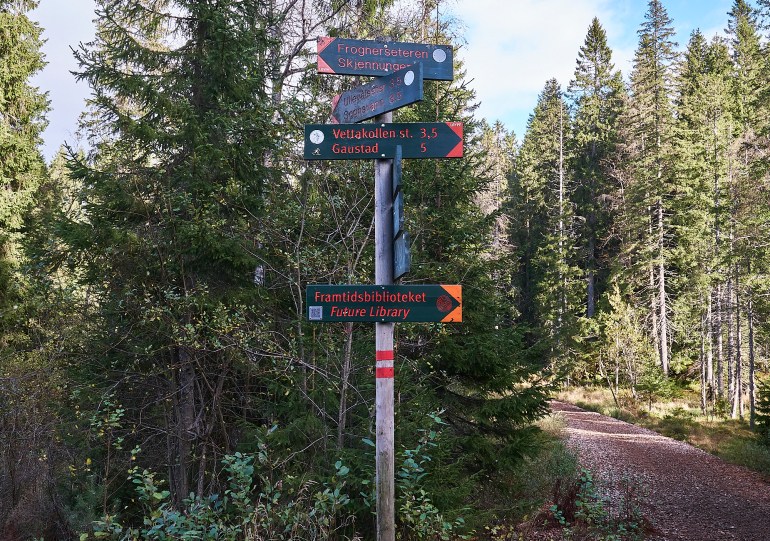
Oslo, Norway — Every May, literature lovers from all over the world walk 40 minutes through the hilly Nordmarka Forest outside of Norway’s capital Oslo and stop at a place where 1,000 Norwegian spruce, planted in 2014, are slowly growing. Here, the foresters make coffee on a fire and people gather around as a writer hands over a manuscript that will not be read until 2114. This is the site of the Future Library, a century-long project conceived by Scottish artist Katie Paterson. The vision is to get 100 carefully chosen authors to submit a manuscript each, one a year, and safeguard the works, unread, for a century, when they will be unsealed and published as a testament to the passage of time, mankind’s endurance and the hope that was imbued in the project by the generations that came before. The manuscripts are sealed inside the “Silent Room” at the city’s spectacular public library, the Deichman Bjorvika. Designed by artists and architects Atelier Oslo and Lund Hagem alongside Paterson, the Silent Room is hidden away on Deichman’s top floor, where Norway’s oldest book is being kept similarly safe from a possible flood. One hundred layers – one for each year and author – line the undulating walls of the Silent Room, folding on top of each other in soft, asymmetric curves from floor to ceiling. They resemble tree rings and are made from the wood of older trees that have been felled to make space for the Future Library forest – a process of continuous regeneration carried out as part of the maintenance of the managed forests around the city. The works can be any length, in any language and style, but all we will know of them, in our lifetime, is the title. There is little danger of a sneak-peak: Each manuscript is encased in a steel box embedded deep within a “tree ring” and hidden behind a glass panel emanating a soft but bright light. It reveals nothing but the author’s name, alongside their year, and is secured by an alarm. Together, these works will create a literary time capsule of each passing year, with future generations – so is the hope – taking over the project’s legacy. The Silent Room has a temple-like calm. No shoes are allowed inside and the room’s soft smell of wood serves as an umbilical cord to the forest outside that will help bring the books to life – today’s saplings that will provide the paper for about 3,000 copies of the anthology. Planted on a slope surrounded by the verdant forest, these young trees form a living amphitheatre around the wooden bench where the handover ceremonies take place. The trees, lit by a soft October sunshine on our visit, look like an audience. It is hard to shake the feeling that they are watching. “But they are!” Anne Beate Hovind, the chairwoman of the Future Library Trust, exclaims. A signpost in Norway’s Nordmarka Forest directs the way to the Future Library. The official agreement for the Future Library forest was signed in May 2022 [Anna Pivovarchuk/Al Jazeera] A 100-year plan The idea of the Future Library came to Paterson on a train journey while she was drawing tree rings on a napkin. Paterson, who has recently unveiled an interactive installation at Apple’s HQ, is known for artworks that challenge our perceptions and ideas of fundamental principles around us, like time, space and our place in them. She has mapped all of the dead stars, outfitted a grand piano to play a Morse-coded version of Beethoven’s Moonlight Sonata, bounced off the surface of the moon and set up a direct phone line to a melting iceberg. It was never going to stop at tree rings. Paterson became fascinated with the notion of deep time in the primordial landscapes of Iceland’s far north where she took on a job as a chambermaid after completing her art degree. She’s since dedicated her career to exploring the profound connection she senses between humans and the planet. It has fostered her love of forests and their sense of timelessness, with trees carrying the memory of an era long before ours. “Books are trees, libraries are forests,” Paterson explains. “Every book you pick up has its origin in a tree somewhere – it was alive.” “It’s actually the shortest time span of all my work. It’s only 100 years,” Paterson laughs, as she speaks of the project over a video call from her home in Fife, Scotland. As the Future Library is about to enter its 10th year, Paterson says the biggest change in the way the project is perceived has been the shift in perspective towards climate and ecology. At the start, she was mostly queried about the physicality of the book and whether books will still exist in 100 years. Now, she says, the questions are turning to the extinction crisis and whether there will be anyone left to read the books. “It’s just horrendous to watch and learn about new oil fields and … the profits going up, still, which is just unthinkable,” Paterson says, frustrated. It’s totally depressing, she admits. But, on the other hand, she sees that change is happening. “I guess artists have always, always responded to that particular moment in time, whatever it might be. And now, this is absolutely our moment,” she insists. Manuscripts are slotted into the walls of the Silent Room. There are one hundred layers – one for each year and author — resembling the rings of a tree [Anna Pivovarchuk/Al Jazeera] Leap of faith With the climate catastrophe and the trajectory of our species at the core of the Future Library project, words like “trust,” “hope” and “optimism” come up incessantly in discussions around the project. It was “such a leap of faith”, Paterson admits – one that found a soft landing in the capable hands of Hovind, who is also the project’s producer. Hovind initially met Paterson in 2011, in her role as
QR code scam to loot devotees in name of Ram Mandir, cautions Hindu body

Vinod Bansal, the spokesperson for VHP, took to X (formerly known as Twitter) to expose the fake social media page titled “Shri Ram Janmabhoomi Teerth Chhetra Ayodhya, Uttar Pradesh.
I don’t care who wins the US presidential election

It was a choreographed scene starring the US president and First Lady that was meant to convey the restorative spirit of the festive season. Last week, Joe and Jill Biden emerged from behind a black curtain like giddy celebrities and took their red seats before a large Christmas tree brimming with decorations and gifts at the Children’s National Hospital in Washington, DC. Their excited audience included a gaggle of young patients and their parents anxious to see the commander-in-chief and his wife who would read aloud the popular poem, The Night Before Christmas. “Thanks for letting us come to see you,” President Biden said. Indeed, every First Lady beginning with Bess Truman – 75 years ago – has made the annual pilgrimage to the children’s hospital “to spread holiday cheer”. In 2022, Biden became the first sitting president to tag along. A frail-looking but animated Biden winked, waved and smiled as the First Lady read from the picture book, holding it aloft. When the First Lady finished, Biden thanked the hospital staff. “It’s special, special what you do.” He had this parting advice: “Where there is life, there is hope.” With that, Biden urged the children to return after they had recovered to offer support to other kids spending the holidays in hospital rather than at home. A hospital official applauded the Bidens for “continuing this annual tradition…[that] brings so much joy to all the children, the families and our staff”. “God bless you all,” Biden said. Their performance lasted less than 10 minutes. However brief, it was designed in part, I suppose, to burnish “Uncle Joe’s” credentials as a caring president who is all too familiar with the worry, heartache and searing pain of caring for ill children or losing them to a sudden, violent act with awful consequences. But watching the Bidens stage this perfunctory ritual – with television cameras in tow of course – only deepened my contempt for a decrepit president who considers the welfare and lives of some children more valuable than others. Instead of using his powers and influence to try to stop the maiming and killing of thousands of Palestinian children, Biden has, in odious effect, encouraged the maiming and killing of thousands of Palestinian children. In occupied Palestine, Biden is not a harbinger of “joy”, but the co-architect of the dystopian carnage engulfing a shattered people and their shattered land. This complicit president, who is fulsome party to a systematic campaign to snuff out life and hope in Gaza and the West Bank, had the near-sickening audacity to share what amounts to a cheap bit of greeting-card-like philosophy that “where there is life, there is hope”. Astonishing. Biden compounded this obscenity by visiting a hospital to praise doctors and nurses tending to the sick while America’s proxy, Israel, has ruthlessly gone about occupying, ransacking and destroying hospitals throughout Gaza and forcibly disappearing and killing Palestinian doctors and nurses. What they did and how they did it – to borrow a phrase – was special, too. That Biden and his handlers were blind to this blatant and ugly juxtaposition is a measure of how disposable and forgettable the promising lives and horrific deaths of Palestinians are in their misanthropic geopolitical calculus. The litany of halting images of the dirt-caked faces of Palestinian children calling out for their lost mamas and babas or small, limp bodies wrapped in white shrouds apparently did not dissuade Biden from playing his part in an agreeable photo op that, given the lethal times and bleak context, stings of indecency. The Bidens’ token appearance and all that it revealed about the president’s signature nature has served as the exclamation point to a brewing realisation that, like a hurricane, has gathered strength and momentum in me since early October. I have been such a fool. I have written columns – that I wish I could erase – praising Biden as a literate, if not honourable, alternative to the mayhem and madness embodied by an illiterate, dishonourable charlatan named Donald Trump. I have written other columns – that I also wish I could erase – extolling the wisdom of enlightened Americans who, I was confident, would choose Biden over Trump again this coming November and spare a fretting world four more years of Trumpian madness and mayhem. Enlightened Americans exist. There just aren’t enough of them. I chided other, much wiser columnists, who wrote that beyond the rhetorical edges, both Biden and Trump were elected to protect the interests – at home and abroad – of the oligarchs they serve under the risible guise of a phantom “democracy” addicted to war and plunder for profit. On this defining score, Biden has proven to be every bit as useful and reliable a marionette as his predecessor. Trump’s offish manners and profanity offend the delicate sensibilities of the liberal and progressive cognoscenti, not his loyalty to the disfiguring status quo. I could not care less who prevails in the upcoming presidential campaign. I will not worry a whit about America’s “future” because if even the recent past is any litmus, history’s most efficient killing machine is bound to cause more death, pain and suffering across the globe – whoever is president. This coming year I will enjoy the entertaining spectacle of a country slipping deeper into fanaticism and dissonance while much of it, predictably, turns to muppets with megaphones, such as Joe Rogan and Bill Maher, for a way out of (or into) the impending abyss. Speaking of muppets, a note to the swarm of nitwits who will, no doubt, caution me to be “careful what I wish for”. How much worse can it get? A genocide is being perpetrated against millions of innocent Palestinians while dear, old Uncle Joe twiddles his knotty thumbs. Rather than get incensed about that, you’ll get miffed at me for writing this “outrageous” column. Priorities. Finally, I think it would be fitting if Trump returned to the White House. Then, all of the daffy guff about
Renowned Australian journalist John Pilger passes away at 84
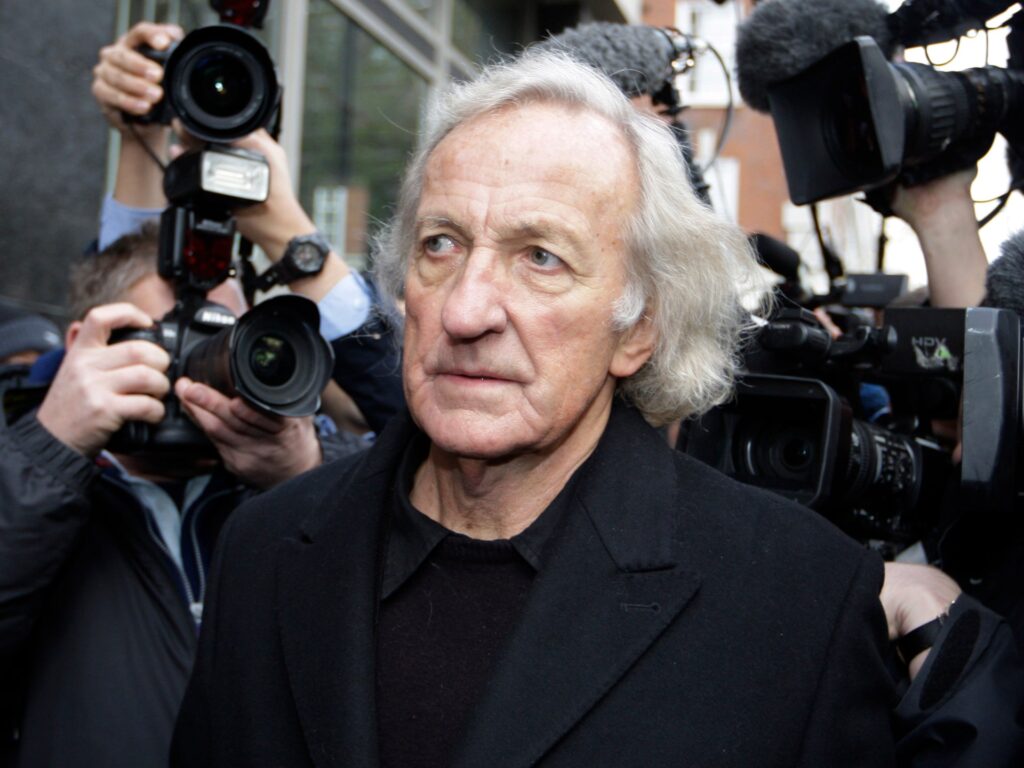
From Palestine to Cambodia, Pilger worked extensively to expose human suffering caused by imperialist governments. John Pilger, the renowned Australia-born investigative journalist who was a trenchant critic of the West’s “imperialist” foreign policy, has died at age 84. His family released a short statement on his social media accounts on Sunday to confirm his passing in London, the British capital, a day earlier. “His journalism and documentaries were celebrated around the world, but to his family he was simply the most amazing and loved Dad, Grandad and partner. Rest in peace,” the statement read. He is survived by long-time partner, journalist Yvonne Roberts, and his two children, Sam and Zoe. Thousands of people took to social media to mourn his death and remember his work. “The world just lost one of its finest journalists and a man of utmost integrity,” one user wrote on X, formerly known as Twitter. “A great journalist, a fine man, and a tower of strength has fallen,” another wrote. ‘Imperialist and colonialist agenda’ Pilger was born in Sydney, Australia in 1939, but developed much of his career when staying in the United Kingdom, where he began working as a freelance journalist in the early 1960s. His main focus was uncovering and exposing abuses of power by governments and large corporations. He was an unwavering critic of the United States, Australia and the United Kingdom’s foreign policies, which he considered to be driven by an imperialist and colonialist agenda. He was a vocal critic of the US-led military interventions in countries such as Iraq and Afghanistan. In his book, The New Rulers of the World, Pilger exposed the role of the West in the 1960s coup in Indonesia and the US-led “war on terror” that ravaged Iraq. Pilger was internationally acclaimed for his documentaries, which chose diverse subject matters and uncovered atrocities from around the world. He made The Quiet Mutiny (1970) after a visit to Vietnam. In 1979, his Year Zero showed the heart-wrenching aftermath of the overthrow of dictator Pol Pot in Cambodia, propelling him to international fame and directing attention to the plight of civilians in the Southeast Asian nation. His latest in an illustrious list of dozens of documentaries, The Dirty War on the NHS, was released in 2019 and detailed an investigation into the woes of the British health system. Pilger was also a serious critic of the Australian government’s treatment of his country’s Aboriginal peoples and wrote The Secret Country – his best-selling history of Australia – and made several documentaries about the subject. He had a long history of writing books and articles and making documentaries about the Palestinian people and their brutal treatment by Israel and its Western allies. Several of his final posts on social media dealt with the carnage unfolding in the Gaza Strip, where nearly 22,000 Palestinians, including many journalists, have been killed so far by the Israeli military since October 7. “When I was last in Gaza, the Israeli air force terrorised the population by flying fast and loud and low at night,” reads a post from last month. “All children bed-wetted and had violent nightmares, said a psychologist, and were ‘damaged forever’. Such is Israel’s exercise of its ‘right to self defence’.” Pilger was a staunch ally of jailed Australian journalist Julian Assange and had spent much of the past decade campaigning for his freedom. Our dear dear John Pilger has left us. He was one of the greats. A consistent ally of the dispossessed, John dedicated his life to telling their stories and awoke the world to the greatest injustices. He showed great empathy for the weak and was unflinching with the powerful.… https://t.co/4ENQMwq5Os pic.twitter.com/L986CI3MlJ — Stella Assange #FreeAssangeNOW (@Stella_Assange) December 31, 2023 “Julian and David are Spartacus,” he wrote in his final published piece last month, in reference to Assange and Australian whistleblower David McBride. “The Palestinians are Spartacus. People who fill the streets with flags and principle and solidarity are Spartacus. We are all Spartacus if we want to be.” Pilger was a two-time recipient of Britain’s Journalist of the Year award and received numerous accolades around the world, including the Sydney Peace Prize in 2009. “It is not enough for journalists to see themselves as mere messengers without understanding the hidden agendas of the message and myths that surround it,” reads his quote that adorns his website and social media accounts. Adblock test (Why?)
Walkout weapon: British school students battle curbs on Gaza war protests
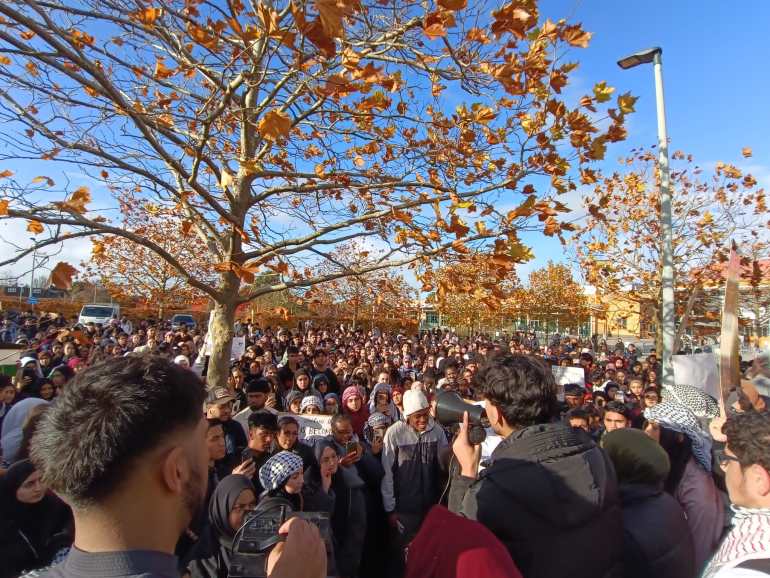
Luton, United Kingdom — At exactly 11am on a Saturday in mid-November, hundreds of students from Luton Sixth Form College streamed out of their school, gathering outside in a sea of black, white and red keffiyehs and Palestinian flags. They carried banners and placards saying “Bombing kids is not self-defence” and “This is no ‘conflict’ it’s genocide”, referring to Israel’s war on Gaza after Hamas’s October 7 attacks on southern Israel. Student organisers of the rally read out speeches against the war, in which Israeli bombs and artillery fire have now killed more than 21,000 Palestinians in Gaza, including more than 8,000 children. Yet Israel wasn’t the only target of criticism at the rally: The students were protesting against their college’s links to an arms company that had supplied weapons and advanced military platforms to Israel. The walkout was organised by the school’s student council after its chair, 18-year-old Hassan Sajjad, was approached by students critical of the senior leadership at the college, who some students felt had failed to address or acknowledge strong student sentiment towards the Israel-Gaza conflict. But a week later, Sajjad and the other council members were informed by the school leadership that their entire council had been disbanded, months before their term was supposed to end in April 2024. Their student council email communication was also suspended. “It shattered my understanding of democracy in college, and the idea of freedom of speech and ‘British values’,” Sajjad said. Since the start of the war, the United Kingdom has seen unrelenting demonstrations urging the government to call for a ceasefire. Yet as students in schools, colleges and universities across the UK also joined the chorus condemning the war, they have also been reprimanded, subtly or explicitly, for their pro-Palestine advocacy in several instances, igniting concerns around freedom of speech. Luton, a town less than 48km (30 miles) north of London with a majority ethnic minority population, has been at the centre of that debate after the backlash faced by students over their walkout. It all started when students discovered that their school had played host to a weapons giant with ties to Israel’s military. Students at the protest at Luton Sixth Form College on November 18, 2023 [Courtesy Miheer Shet] ‘Protest to have your voice heard’ Though Israel is today a major arms exporter, it continues to import weapons from the West. The United States is its biggest military partner and the source of 83 percent of Israel’s weapons imports between 1950 and 2020. But the UK has also been a steady military ally to Israel. It has licensed arms worth more than 442 million pounds ($563m) to Israel between May 2015 and August 2022 and is now facing a legal challenge in the High Court from Palestinian human rights groups. Demonstrations have been held outside other arms factories like those of defence giant BAE Systems and Leonardo — formerly known as Finmeccanica — which produce parts for Israeli fighter jets. In late October, dozens of trade unionists protested outside the Kent site of Instro Precision Ltd, a British subsidiary of Israeli weapons manufacturer Elbit Systems. Yet there are more subtle ways in which Israel’s war machine intersects with British educational institutions. Leonardo, one of the world’s largest arms companies, manufactures naval guns installed on Israeli warships used against Gaza in the current war. In a “multi-billion dollar” deal, Leonardo supplied seven training helicopters to Israel, according to The Times of Israel. It also provided the Israeli Ministry of Defense with “advanced mobile radars” in June. Thirty percent of the company is owned by the Italian Ministry of Economy and Finance according to Campaign Against Arms Trade, with substantial production in both the US and the UK. Leonardo has also participated in career fairs at British schools and colleges — including Luton Sixth Form College, students discovered, as scrutiny on Israel’s weapons suppliers grew with the spiralling death count of Palestinian civilians in Gaza. Since the start of the October 7 war, Leonardo’s market valuation has grown by 20 percent. A walkout wasn’t the student council’s first planned course of action against the war. The council – who represent over 3,000 students – suggested organising a fundraiser for Gaza and the occupied West Bank. As the civilian death count mounted in Gaza, the council also flagged the college’s relationship with Leonardo. For about a month, their requests were met with silence. Then, the school’s leadership said the students could fundraise but only for an event that wasn’t specifically for Palestinians. “If students aren’t being catered for and the [school leaders] are not respecting the student council – the people who represent the thousands – then you only have one option left: that’s to protest to have your voice heard”, Sajjad said. On November 18, hundreds of students walked out of their lesson in what was a peaceful protest. “We wanted students to know this is your legal right to protest, and you shouldn’t feel pressured or afraid to protest”, said Arsalan Ilyas, 17, a student at the college. ‘Inherently Islamophobic’ The crackdown on the now-suspended council was swift, but its members soon discovered more. They found out, from social media platform X, that Shout Out UK, an organisation that aims to equip people with “critical thinking skills and emotional resilience needed to question divisive or extreme content” according to its CEO, Matteo Bergamini, was delivering workshops at the college in December. The news sparked further outrage among students, as Shout Out UK has worked on a number of Home Office Prevent programmes across the country, with a focus on countering extremist misogyny, online disinformation and the far right. Prevent, the UK government’s controversial counter-terrorism programme which aims to “stop people from becoming terrorists or supporting terrorism”, has been accused by critics of conflating extremism – and on occasion, pro-Palestine advocacy – disproportionately with Muslim students. According to Waqas Tufail, a reader in Criminology at Leeds Beckett University, pro-Palestinian activism has long been regarded “formally and informally” as
What’s the Philadelphi Corridor border zone that Israel wants to control?
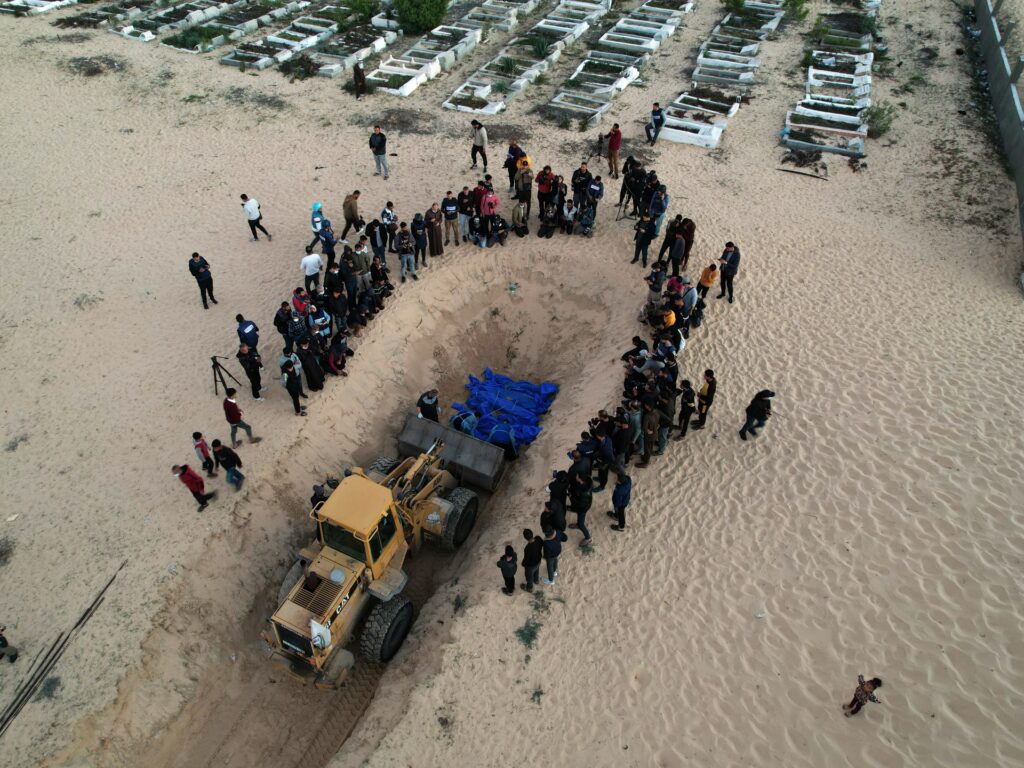
Israel has said it wants to take control of the entirety of the border area between Gaza and Egypt as it signals that its brutal war on Gaza is nowhere near the end. Prime Minister Benjamin Netanyahu told a weekly news conference on Saturday that the Philadelphi Corridor “must be in our hands” and shut down to ensure the security outcome Tel Aviv desires. Israel’s war on the besieged enclave has killed more than 21,000 Palestinians. With the fighting now in its 13th week, what is the significance of the corridor, why does Israel want control and what could be the implications? What’s the Philadelphi Corridor? The Philadelphi Corridor, also known as the Philadelphi Route, is the 14km (8.7-mile) long strip of land that represents the entirety of the border area between Gaza and Egypt. It was established as a buffer zone controlled and patrolled by Israeli armed forces as part of the 1979 peace treaty with Egypt that ended Israel’s occupation of the Sinai Peninsula and reopened the Suez Canal. Its stated purpose was to stop weapons and material from reaching the hands of Palestinians inside the Gaza Strip, which Israel occupied, and to prevent people from moving between the Palestinian lands and Egypt without tough checks. “It must be shut. It is clear that any other arrangement would not ensure the demilitarisation that we seek,” Netanyahu said on Saturday, also signalling the war may last many more months. [embedded content] Where does Egypt stand on this? In 2005, Israel withdrew from the Gaza Strip under international pressure and instead turned the densely populated Palestinian land into the world’s largest open-air prison. Egypt became the main player in control of the corridor, which signifies the only link with the outside world not controlled by Israel – as Tel Aviv maintains a land, sea and air blockade of the strip from all other sides. An agreement after the Israeli disengagement from the area in 2005 allowed Egypt to deploy 750 soldiers and heavy arms to patrol and safeguard the Egyptian side of the corridor, with the responsibility of the other side handed over to the Palestinian Authority. But Hamas was in full control of the Gaza Strip some two years after the Israeli withdrawal, and things changed. Over the years, Egypt said it kept destroying tunnels dug out by Palestinians to smuggle weapons and people, but Israel has questioned the effectiveness of Cairo’s moves. Now, Israel wants full control of the border area, which includes the crucial Rafah crossing, supposedly to ensure its security. But that would amount to a de facto full reoccupation of the Gaza Strip, something Israel and the US have publicly disagreed over. Both Egypt and Hamas have been against Israel regaining control of the corridor, and Egyptian President Abdel Fattah el-Sisi has repeatedly said Cairo won’t allow Palestinians to be displaced from their homeland into Egypt. What’s Israel after? Netanyahu wishes to reassure his domestic audience – which has grown angry and critical of his handling of the war and his failure to bring back dozens of captives still in Gaza — according to Rami Khouri, a journalist and distinguished fellow at the American University of Beirut. At the same time, Khouri said, the Israeli PM wants to instil more fear among Palestinians and create fresh leverage for negotiations with the US and Egypt. “So, anything he says has multiple audiences, multiple purposes, and should not be taken at face value,” Khouri told Al Jazeera. “We have to take this as another element that he is throwing in the negotiating pot.” Khouri said Egypt would not agree to Israel retaking control of the corridor and establishing a military presence there decades after it left. He said Netanyahu’s comments can also be viewed within the context of Israel’s constant pursuit of territorial expansionism since its creation in 1948 — even though this has not brought the country security. “The more they expand, the more they control land, the more they try to be secure by taking over people’s lands and driving people out of their homes, the less secure they become because they just instigate greater and more intense forms of resistance by Palestinians and other people, including Hezbollah in Lebanon.” Didn’t Israel want another corridor in the north? Yes, Israel brought up the idea of another “buffer zone” along its border with the northern part of Gaza with Arab leaders and the US last month as part of its “day after Hamas” plans. Tel Aviv reportedly wants to raise this corridor inside Gaza in order to make sure it won’t suffer another attack like the one on October 7 by Hamas that killed about 1,140 people inside Israel. Earlier this month, White House National Security Council Spokesman John Kirby said Washington opposes “any reduction of the geographic limits of Gaza”. The US has also said it wants the Palestinian Authority to take over security of the Strip, contradicting Israel’s aspirations for establishing a direct presence there. [embedded content] Adblock test (Why?)
Pro-Palestine campaigners call for Gaza ceasefire on New Year’s Eve
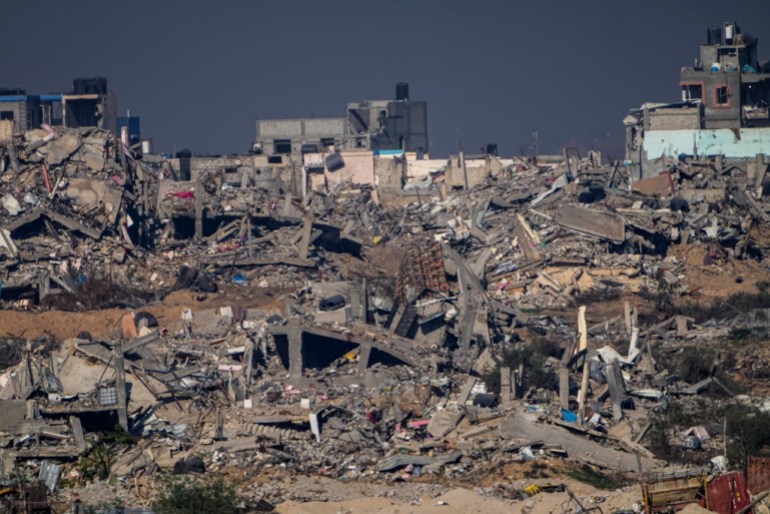
Activists are asking people to turn the New Year’s countdown in their countries into a countdown for a ceasefire in Gaza. Activists have launched a global campaign asking people to turn the New Year’s countdown in their countries into a countdown for a ceasefire in Gaza, which has been under devastating Israeli bombardment since October 7. “New Year’s Eve is a moment of celebration worldwide, and an opportunity to create resolutions for a brighter future. With nearly 30,000 civilians killed, including over 10,000 children, our only New Year’s resolution is to call for a permanent ceasefire,” Countdown2Ceasefire, a London-based grassroots campaign, said in a statement on Thursday. “Our aim is to morph the traditional New Year’s countdown into an influential and resounding countdown for a permanent ceasefire in Gaza.” So far the campaign has successfully been embraced by activists in over 30 countries, including Switzerland, Turkiye, Malaysia, Australia, Tanzania, Mexico and Germany, according to the organisers. While ringing in the new year, these local events calling for a ceasefire will be livestreamed across Countdown2ceasefire’s social media platforms. Israeli bombings have destroyed more than 70 percent of Gaza homes [File: Ariel Schalit/AP Photo] “A permanent ceasefire is the first step in ending the current deplorable situation and a tangible move towards a future where traumatised communities can rebuild and recover,” Bushra Mohammad, a campaign spokeswoman, said in a statement. Israel’s brutal military offensive in Gaza has killed more than 21,500 people and wounded more than 55,000 others triggering a global outrage, with protesters across the world rallying to call for a ceasefire. Many have also expressed their disappointment towards politicians and countries who vetoed or abstained from voting for a ceasefire at the United Nations. Rights organisations including Human Rights Watch, Amnesty International and Doctors Without Borders also condemned countries vetoing a ceasefire, warning that this would result in a humanitarian disaster. On Saturday, the World Food Programme warned that it’s in a race against time to avert starvation for millions in Gaza. “Only a long-term ceasefire and unhindered humanitarian access can end this,” the UN agency posted on X. Israel has refused to stop the bombing that has destroyed more than 70 percent of Gaza homes and displaced more than 90 percent of the enclave’s 2.3 million people. Countdown2Ceasefire pointed out how people power can make a difference. “As we enter 2024, we look forward to it being the year that our New Year’s resolution, of a permanent ceasefire in Gaza, is fulfilled.” Adblock test (Why?)
Israel-Hamas war: List of key events, day 86
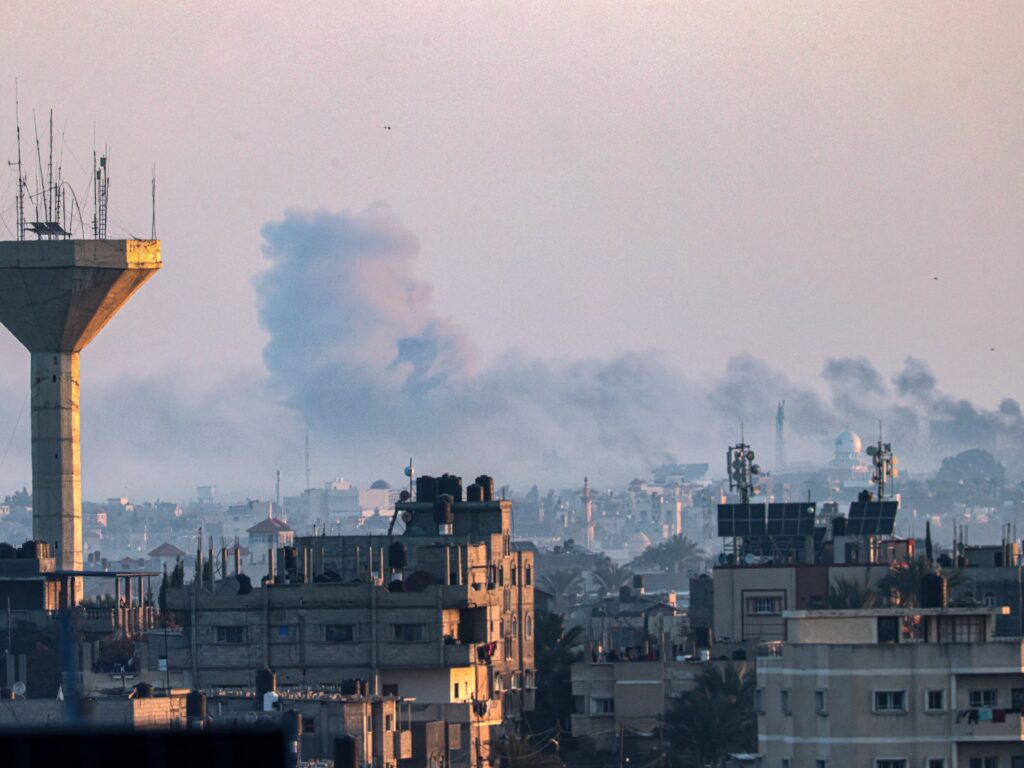
At least 100 killed in central Gaza, while night-time raids injure 17 in occupied West Bank – here is the latest. Here’s how things stand on Sunday, December 31, 2023: Latest updates and human impact: Israeli military attacks on homes in central Gaza have killed at least 100 people and wounded 286 in less than 24 hours, according to Gaza’s Ministry of Health. The continuing Israeli bombardment has now destroyed more than 70 percent of Gaza’s homes, the Government Media Office says. The occupied West Bank saw another night of raids and drone attacks as at least 17 Palestinians were wounded in Tulkarem and Nur Shams refugee camps. There is a growing exodus of displaced Palestinians into the far southern town of Rafah, with some 100,000 fleeing there in just a few days, according to the United Nations. Prime Minister Benjamin Netanyahu has said Israel should control the border zone between the Gaza Strip and Egypt. Egypt has rejected the prospect of ceding this territory to Israel. Twenty-three Syrian fighters have been killed by air raids believed to be waged by Israeli forces, according to the Syrian Observatory for Human Rights, as hostilities build between Israel and Iran-aligned groups in the region. Israel also traded strikes with Hezbollah. The Lebanese group claimed four attacks on Israeli territory over the past day, while Israeli strikes killed at least one Hezbollah fighter. The Palestine Public Broadcasting Corporation strongly condemned Israel for reportedly hacking a local radio station and broadcasting “threatening messages” to Gaza residents already traumatised by war. In Gaza, at least 21,822 people have been killed and 56,451 injured in Israeli attacks since October 7. The revised death toll from Hamas’s attack on Israel stands at 1,139. Diplomacy: The Organisation of Islamic Cooperation welcomed South Africa’s decision to file a genocide case against Israel at the International Court of Justice (ICJ), saying that the charge is warranted because of Israel’s “indiscriminate targeting of the civilian population”. Several genocide experts also welcomed the move, with British war crimes prosecutor Geoffrey Nice telling Al Jazeera it is a “courageous” step. Israeli Prime Minister Benjamin Netanyahu thanked the administration of US President Joe Biden for its continued backing during the war, including approval of a new emergency weapons sale, the second this month. Foreign Minister Eli Cohen told Israeli media that the government bears some responsibility for failing to prevent Hamas’s attack on October 7. He called for an investigation committee to be formed to hold those who were “negligent” accountable. Israel is prepared to let ships deliver aid to Gaza “immediately” through a proposed sea corridor from Cyprus, according to Cohen. Commercial vessels targeted in the Red Sea: Yemen’s Houthi rebels waged multiple attacks on a container ship owned by global shipping giant Maersk, according to the US military, prompting the firm to suspend operations in the Red Sea for 48 hours. In the last alleged Houthi attack on the Maersk ship, US helicopters responded to and fired at attacking Houthi boats, sinking three of them and killing several crew, according to the United States Central Command. Britain’s Foreign Secretary David Cameron said he conveyed to Iran’s foreign minister that Tehran shares “shares responsibility for preventing these attacks, given their longstanding support to the Houthis”. I spoke to @Amirabdolahian today about Houthi attacks in the Red Sea, which threaten innocent lives and the global economy. I made clear that Iran shares responsibility for preventing these attacks given their long-standing support to the Houthis. — David Cameron (@David_Cameron) December 31, 2023 Adblock test (Why?)
Indian Navy steps up surveillance in Arabian Sea after rise in drone attacks

Liberian-flagged cargo vessel MV Chem Pluto, with 21 Indian crew members, was the target of a drone attack off India’s west coast on December 23, triggering security concerns as the incident came amid Iran-backed Houthi militants launching strikes on several commercial ships.

